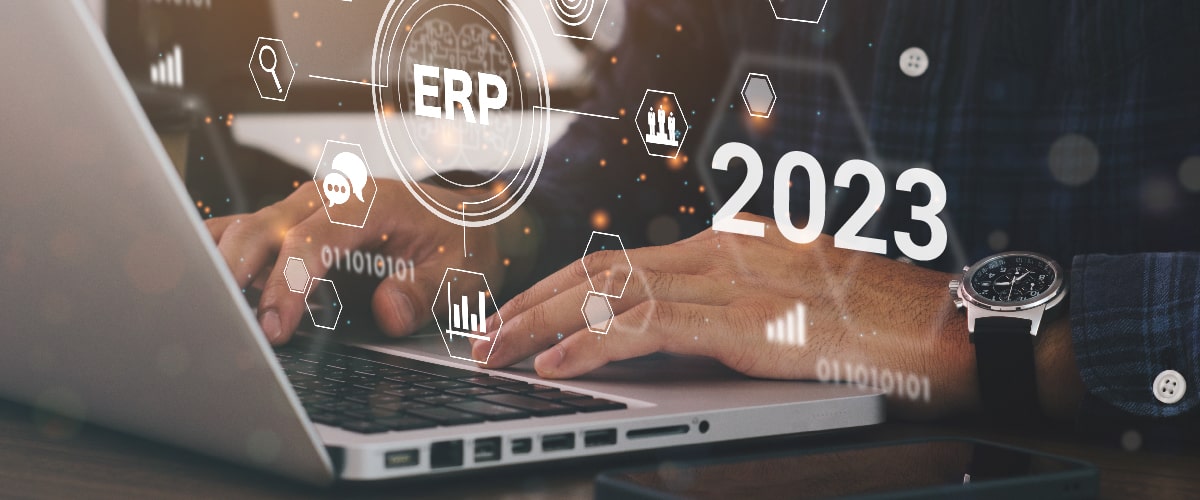 Web Content Viewer
Web Content Viewer
2023 ERP Predictions and Technology Trends

As 2022 unfolded, we experienced ongoing supply chain challenges, the continued shift from remote to hybrid work for many businesses, persistent cybersecurity attacks, labor, and inventory shortages, and more. The year saw even more companies shore up security defenses and move their enterprise data to the cloud. As we look ahead to 2023, what can business leaders expect? The following are a few predictions for companies across all industries and offer insights into the future ERP marketplace.
100% Chance of Clouds
Companies will continue to move from on-premise to the cloud. Many companies that have on-premise ERP are facing challenges of end-of-life operating systems, difficulties finding IT staff, remote employees needed access to systems, and inadequate defenses against the ever-evolving security threats, especially ransomware attacks. Therefore, the cloud market will need to become even more flexible in 2023. This includes taking holistic approaches to security and data storage, offering real-time security monitoring, analytics, and more to help businesses get the most from the cloud. This becomes even more critical when considering that remote work is here to stay for many businesses as we head into the future.
The benefits of moving data to the cloud are numerous. Cloud providers adhere to the latest cybersecurity policies and protocols, ensuring systems and networks meet regulatory compliance standards. Additionally, cloud providers monitor your data in real time and provide 24/7 support. With VAI Cloud for example, all updates are done seamlessly behind the scenes and will have a tremendously positive impact for the customer.
Cybersecurity and Data Protection
The most important tech story by far in 2022 has been cybersecurity. It’s no longer just covered in tech media; the major media is reporting this topic almost daily. Organizations are projected to spend a collective $188.3 billion on information security and risk management products and services in 2023, according to Gartner. This is impacting everything from governments and large corporations to very small businesses and individuals. This can range from something as severe as ransomware attacks down to daily phishing attempts.
Security first is a practice all businesses should follow, and VAI has always had that model. Without security first, there can be no stability, scalability, and a highly functioning cloud environment. Businesses cannot operate today without a security first model – it’s now become an imperative.
Cybersecurity will continue to be one of the biggest and most severe disruptors for businesses, governments, and institutions of all types across the globe. In 2023 we will see many instances of ensuring secure operations utilizing advanced AI to detect the ever-changing malware landscape. Ongoing advancements in tightly securing clouds is also going to continue cloud adoption.
Mobile Access is the Road to Success
Mobile tools are now critical for businesses and provide streamlined and real-time capture of data straight from the source. For example, sales reps. can place orders immediately and directly from their mobile device when meeting with a customer, and customers can place orders immediately while they are checking inventory, at any time. Companies need this accurate and timely flow of data to make smarter, better-informed business decisions. The offline capability of mobile enterprise solutions (with data and processes syncing as soon as the user is back in the Wi-Fi range) will continue to be increasingly demanded as well.
An ERP solution that offers mobile applications are also giving supply chain managers full observability of the warehouse, allowing them to quickly patch fixes if something goes wrong.
Evolving Artificial Intelligence
Artificial Intelligence (AI) is not yet accessible enough for the average business employee and will continue to evolve in 2023 and beyond. Today, embedded analytics helps users gain some insight, but full access to AI is still complex and not yet ready for prime time. However, AI has already affected most every major industry, particularly in the past few years, as data collection and analysis has ramped up considerably because of robust IoT connectivity, the proliferation of connected devices, and ever-speedier computer processing.
While some sectors are just beginning their AI journey, others are veteran travelers, and both have a long way to go. Regardless, the impact AI is having on our present day lives is hard to ignore. The next generation of intelligent ERP systems must be accessible by the average user. For the future, ERP vendors will continue to evolve their solutions to incorporate AI to help companies streamline business processes and achieve new levels of efficiency.
Moving into 2023, we'll see businesses continue to place more emphasis on technology such as cloud, cybersecurity, and data protection, mobile applications adoption, and evolving AI to ensure maximum business success in the years to come.
Gina Parry
National Account Manager
National Account Manager
Comments
By using this site you agree to our Privacy Policy and our Terms of Use.
120 Comac Street
Ronkonkoma, NY 11779
Ronkonkoma, NY 11779
 | Vormittag Associates, Inc. ©2025 |
| Vormittag Associates, Inc. ©2025 |